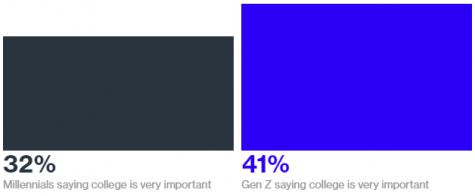Okay, Zoomer
Most kids in high school currently would find that their parents are considered “Gen X”(born between 1965 and 1979), often deemed a forgotten generation, which Time magazine mocked as being “hardly recognized as a social force or even noticed much at all.” That is, until they created something that excites the success of many modern day companies: Generation Z. In an effort to better understand Generation Z (born between 1995 and 2015), marketing companies and older generations are taking classes on social media and memes, in an effort to crack the “kids’ code.” Experts have explored links between millennial behavior and boomer influence, and since then have discovered just how similarly Gen X parents have influenced their Gen Z offspring.
Parenting in itself is said to be one of the greatest influences on the way that a generation views work, education, spending and success. Nonetheless, the way that Gen Z has been educated and influenced on these topics based on the beliefs of their Gen X parents, who were likely influenced in their younger years by a series of crises such as Watergate, the Challenger explosion, the fall of the Berlin Wall, and Rodney King. Also in the 1970’s, divorce rates spiked to some of the highest rates in history, which gave rise to a number of “latchkey” kids, who sought security and grew up in a less forgiving workplace. Corey Seemiller, who has conducted research and written several books on Generation Z, claimed that “Gen X is raising Gen Z to look like them: autonomous, cynical, with looser reins… they figure things out themselves.”

Since then, many studies have been conducted regarding generational connections. For example, the University of Michigan has surveyed high school seniors annually since 1975, monitoring their look on the future. The study showed that Gen X and Gen Z were within one percent of each other in terms of who voted ‘yes’ on the fact that things in the rest of the country will get worse in the next five years. It comes as no surprise that there is no way to definitively prove that Gen Z’s skepticism and morals were instilled in them fully by their Gen X parents. However, evidence suggests that Gen X has had a profound influence on their Z kids, where similar numbers by boomers and millennials imply the same trend.

Education Matters: youngest generation sees more benefit from higher education
Additionally, studies have been conducted which test similarities and differences among zoomers and millennials. Research suggests that Gen Z, more so than millennials, believe that higher education is beneficial. It has been suggested that since Gen X kids came of age in an era where blue-collar jobs were on the decline, they valued a college degree more in means of a successful career, which they likely instilled in Gen Z.
As interesting as it is to compare generational differences, it would come as no surprise that each generation is uniquely its own, plagued by issues the generation before knew nothing of. For Gen Z in particular, the American Psychological Association’s annual Stress in America survey says that issues such as gun violence, sexual assault claims and immigration are the main causes of stress for this generation of young adults. With the number of school shootings on the rise since Columbine in 1999, Gen Z values campus security more than any other generation (for good reason). Not only that, but the introduction of the Me Too movement may have may have influenced Gen Z’s stress levels regarding sexual assault claims. Conversely, Gen X is most stressed about financials and job security, likely a result of being a part of the working class through the Great Recession, which began in 2007.
As time cycles and kids are born, each generation is predisposed to events, which oftentimes shape the way they view modern day issues. This may cause an uproar of stressors, but more than anything, each generation is evolving. For one, Zoomers are said to be more likely (than, say, millennials) to save a big chunk of their income and to use budgeting apps. Not only that, but Bloomberg describes them as being “a very old group of young people,” who drink less, take fewer drugs (minus marajuana), and have less sex. Some argue this is a matter of the introduction of technology, although there are still parallels here with their Gen X parents, who viewed drugs and sex as dangerous due to the AIDS epidemic and Nancy Reagan’s “Just Say No” campaign. Gen Z is also said to experience increased levels of depression and anxiety due to generational stressors, although an estimated 37% of Gen Z individuals—more than any other generation—reported receiving help from a mental health professional. Only 35% of millennials, 26% of Gen Xers and 22% of baby boomers reported receiving help for mental illness.
Given all the stats, it is easy to believe that Generation Z has an ambitious streak, where three out of four high school students said they had hopes of owning their own business someday. Maybe that drive was instilled in them by their Gen X parents, or maybe time sensitive events and innovations have shaped this generation into the most savvy one yet.
Your donation will support the student journalists of Fossil Ridge High School. Your contribution will allow us to purchase equipment and cover our annual website hosting costs.

Jaidyn Nelson, a senior, is currently taking her first year of Journalism and excited to begin her year as an on-staff member. Throughout the last months of her high school journey, Nelson will be working on covering the school’s activities, including school orchestrated events, dances, and other productions...













Joel Coppin • Nov 18, 2019 at 9:43 am
Hi Jaidyn, After reading this article I’m slightly confused. What is the thesis of his article? The purpose is nowhere near as clear as your last article. Even though the last one was super disagreeable, you got your point across. I don’t know if that was helped by the fact that the thesis was in the title. Maybe next article you will combine the sensible writing of your last article with a thesis that makes sense to your audience.
Best,
Joel